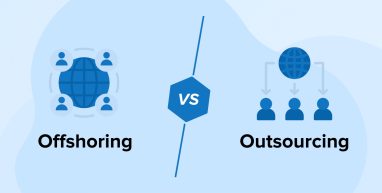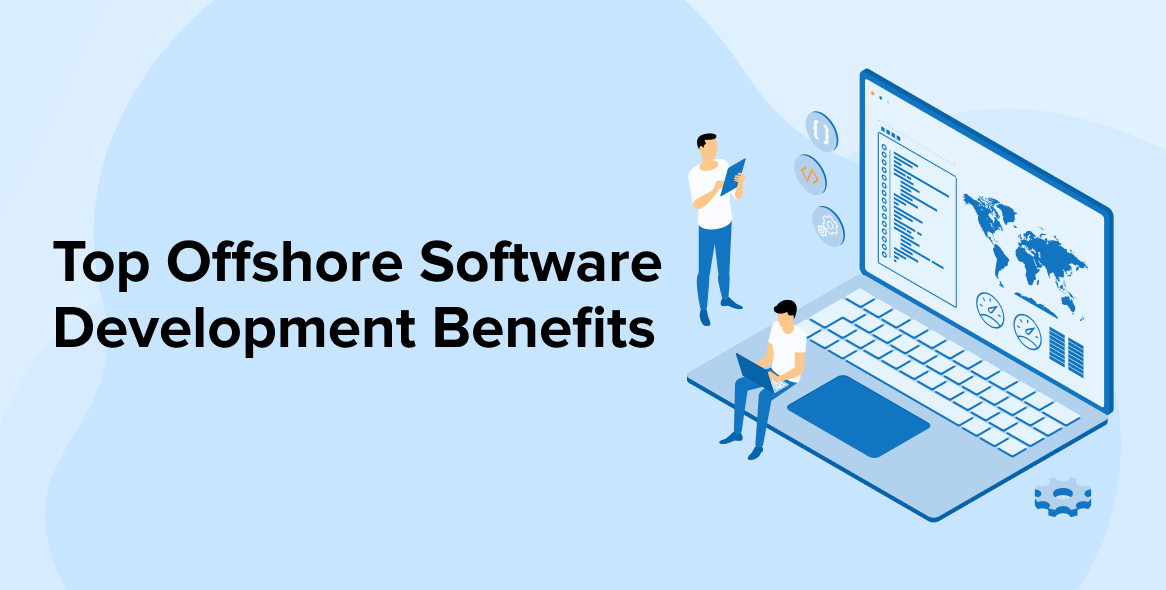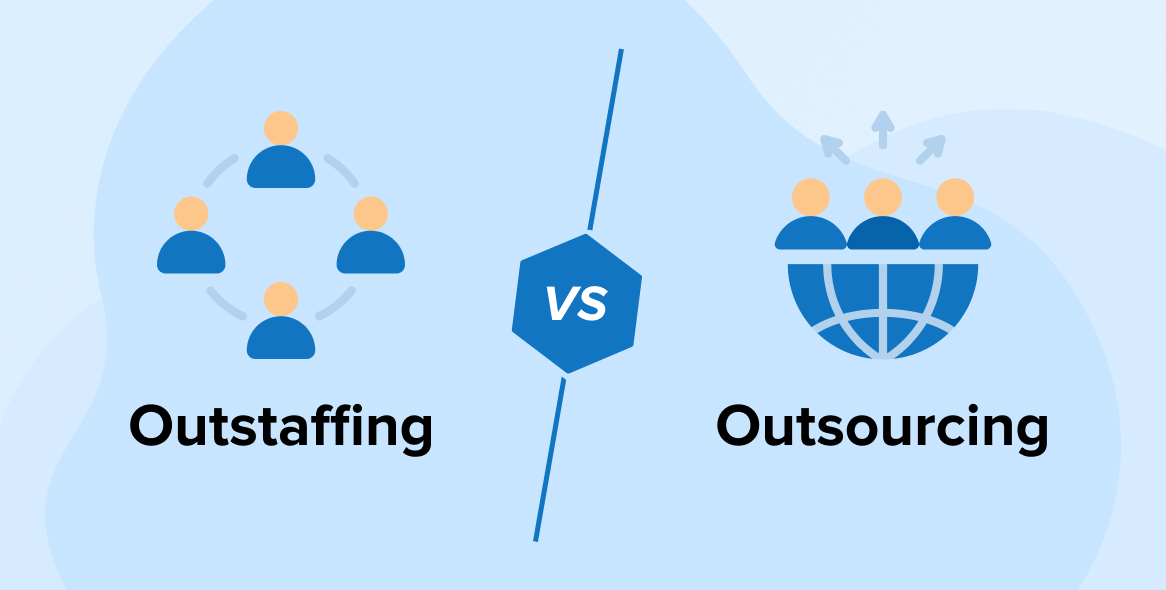
In the modern digital economy, businesses continually explore ways to reduce costs, access global talent, and enhance operational efficiency. Two strategies that have gained significant popularity are offshoring and outsourcing. You might have heard these terms used synonymously, but they represent distinct approaches with unique advantages and challenges. Companies need to understand the difference when choosing the right model for their specific needs.
In this blog, we’ll explore the key differentiating factors between offshoring and outsourcing, their advantages and disadvantages, and how each impacts business operations. Whether you’re a startup looking to scale or a large enterprise aiming to optimize resources, knowing when to partner with an offshore software development company versus an outsourcing firm can make a big difference in your project’s success.
1. Overview of Offshoring
Offshoring is a business strategy in which a company creates a dedicated team or outsources certain operations to a third-party provider located in another country. The primary goal of offshoring is often to reduce costs by delegating tasks to a location with lower operating or development expenses. For instance, an American software company hires an Indian firm to manage its support operations.
1.1 Advantages of Outsourcing

We’ve a general idea regarding why companies go for offshoring. However, let us discuss the key advantages of offshore development for better clarity:
1. Cost Savings
Cost efficiency is a leading factor behind the rise in offshoring. Nations in Asia and Africa offer more affordable labor than Western countries. Companies reduce expenses by hiring skilled professionals in regions with lower living costs, enabling them to manage budgets more effectively while maintaining productivity.
2. Access to Large Talent Pool
In today’s fast-paced digital landscape, technology is evolving rapidly, pushing companies to keep up with emerging trends to stay competitive. Skills in cutting-edge fields like AI and data science are in high demand, yet local talent is often scarce or insufficient. Offshoring offers a practical solution by giving businesses access to a global talent pool. This approach enables companies to find experienced professionals while staying within budget, ensuring they can meet technological demands without compromising on quality or cost.
3. Scalability
Offshoring allows businesses to adjust their workforce quickly based on shifting project demands. Instead of spending time and resources recruiting and training internal staff for secondary tasks, companies can rely on offshore partners to handle them efficiently. This flexibility lets clients focus on core operations while the offshore team manages the rest. If fewer specialists are needed later, scaling down is fast and simple. Unlike in-house teams, where downsizing can be slow and complicated, outsourcing makes such transitions smoother and quicker, enabling companies to respond more effectively to project changes.
1.2 Drawbacks of Outsourcing

Here are the challenges that companies often face with offshoring:
1. Communication Challenges
Offshore centers, often situated in distant countries or on different continents, can create communication challenges. Cultural and language differences may cause misunderstandings, leading to delays and quality issues in projects. These barriers require careful management to ensure clear collaboration and successful outcomes despite the geographic separation.
2. Difference in Time Zones
Western countries often choose Asian nations for offshore development, which creates a significant time-zone gap—often around five and a half hours. This difference can cause communication delays and coordination challenges. To overcome these issues, teams should mutually agree on overlapping working hours to facilitate real-time collaboration. Additionally, using project management tools like Trello and Jira helps keep tasks organized and aligned, ensuring a smooth workflow and better synchronization between geographically dispersed teams.
3. Security Concerns
Offshoring can pose several security concerns, especially when dealing with sensitive information and intellectual property. Risks include data breaches, unauthorized access, and weak compliance with international security standards. Differences in data-protection laws across countries may also create vulnerabilities. Without strict access controls, secure communication channels, and proper vendor screening, critical information may be exposed. To mitigate these risks, companies must enforce robust cybersecurity policies, require clear confidentiality agreements, and conduct regular audits of offshore partners.
1.3 When Can Clients Consider Outsourcing?
Clients can prefer outsourcing in case of:
1. Resource Crunch
When internal teams are occupied with critical tasks and resources are limited, clients may opt to outsource development. An external partner can complete the needed software on time, ensuring deadlines are met without disrupting existing projects. This approach maintains productivity while efficiently addressing additional development needs.
2. Round-the-Clock Customer Support
In the post-COVID digital era, 24/7 customer support has become essential for business success. Limited in-house resources make continuous support difficult. By utilizing a global team across different time zones, companies can provide seamless, round-the-clock service. This approach boosts customer satisfaction, enhances responsiveness, and increases efficiency without placing extra strain on internal staff.
3. Get Funding
Outsourced development enables startups to quickly build and launch a minimum viable product (MVP) for market entry. A working prototype attracts investors more effectively than a concept alone. With a tangible product, startups are more likely to secure funding, which can be used to enhance features, fix issues, and evolve the application to meet user needs.
2. Overview of Offshoring
Outsourcing software development means a company delegates either the entire development effort or certain tasks to an external service provider. This provider can be located within the client’s country or abroad. The provider handles the full software development lifecycle, including planning, execution, and ongoing support. The outsourcing company is also responsible for recruiting and managing the development team according to the project’s needs. Meanwhile, the client steps back from daily management and project oversight, trusting the external provider to deliver the work independently and efficiently. The global business process outsourcing market size was estimated at USD 302.62 billion in 2024 and is projected to reach USD 525.23 billion by 2030, growing at a CAGR of 9.8% from 2025 to 2030.
2.1 Advantages of Offshoring

The following are the key benefits of software outsourcing:
1. Focus on Core Activities
Outsourcing helps businesses improve efficiency by assigning technical or specialized tasks to external professionals. This approach enables internal teams to concentrate on core operations and strategic goals without being sidetracked by nonessential functions. For example, a healthcare startup planning to build a patient management system can outsource the development to skilled experts. This lets the internal team prioritize quality care and patient engagement while ensuring the software is developed effectively. Overall, outsourcing supports better resource use, higher productivity, and business growth.
2. Risk Mitigation
Outsourcing to experienced partners helps businesses manage project risks more effectively. These vendors bring deep expertise in project management, risk assessment, and software development best practices. Their ability to foresee and address potential issues early reduces the likelihood of costly delays or failures, especially in projects involving new or complex technologies. For companies entering unfamiliar markets or launching innovative products, outsourcing provides a layer of protection against uncertainties, helping to ensure smoother execution and greater control over timelines and budgets.
3. Expert Domain Knowledge
Outsourcing is a smart strategy when internal teams lack specific expertise. Trusted outsourcing partners often have dedicated R&D centers and stay current with the latest technologies and trends. They maintain vast talent pools, allowing quick access to advanced skill sets and technical knowledge. This reduces project setup time and accelerates innovation. By utilizing their resources and advanced tools, businesses can remain agile and competitive without the expense of building in-house capabilities or maintaining expensive infrastructure.
2.2 Disadvantages of Offshoring

Let’s now understand the drawbacks of outsourcing to third-party service providers:
1. Hidden Costs
Many clients find that the outsourcing cost agreed during initial negotiations changes over time. They may end up paying extra for unnecessary overhead, or receive bills that include fees they did not anticipate when signing the contract. Why does this happen? At the start, service providers may suggest lucrative service packages with initial quotes that do not fully disclose all associated expenses. This lack of transparency eventually results in unanticipated costs emerging in the latter stages of the project lifecycle, increasing budget constraints.
2. Lack of Control
A lack of control is a serious limitation clients face when working with outsourced teams. The service provider is responsible for the development work done remotely, so the client does not directly oversee project progress. This limitation can cause frustration and a feeling of powerlessness in accomplishing project objectives. Both parties must figure out ways to ensure regular updates and a proper feedback loop.
3. Quality Control
Outsourcing can make maintaining quality control more difficult. Different vendors apply different quality safeguards, which can lead to inconsistencies in the product quality. It may happen that after the product’s delivery, the client observes that the product is below their expectations or the quality criteria aren’t up to the mark. Therefore, they may have to incur extra charges for revisions and corrections. To prevent this, set clear quality benchmarks, require documented acceptance criteria, and perform end-to-end testing before final acceptance. Be aware that these measures can add time and complexity to the process and should be factored into the project schedule and budget.
2.3 When Can Clients Consider Offshoring?
Let’s understand the favorable conditions behind offshoring software development tasks:
1. Entering New Markets
Clients seeking international expansion may use offshoring to establish a local presence in target regions. This helps them understand regional markets, improve localization, and build relationships with local customers and partners.
2. Mitigating Local Talent Shortages
In regions where certain technical skills or qualified professionals are scarce, offshoring provides a practical solution to talent shortages. Instead of delaying projects or compromising on quality due to limited local resources, companies can hire offshore teams that possess the required expertise.
3. Long Term Goal
Offshoring is a long-term strategy because it involves setting up operations abroad, which requires significant investment and commitment. Companies use it to build a lasting presence in a new market and to benefit from local resources, cost advantages, and market access. This approach helps firms establish deeper ties and achieve sustainable growth, making offshoring more suitable for enduring business goals than for short-term projects.
3. Key Differences Between – Offshoring and Outsourcing
Distinguishing between offshoring and outsourcing can be challenging because they share several common features. They may seem alike, leading to frequent confusion. However, despite these surface-level similarities, the two are based on different principles.
3.1 Cost
- Offshoring: Significantly reduces labor costs by partnering with teams in countries that have lower wage structures. It’s ideal for long-term projects seeking continuous development at cost-effective rates.
- Outsourcing: Helps manage expenses by hiring external experts for specific tasks or short-term needs. It eliminates the costs of recruitment, training, and infrastructure while ensuring timely, high-quality deliverables.
3.2 Control
- Offshoring: When a company directly hires its own offshore team, it maintains significant control over day-to-day operations and workflows. However, involving a third-party provider reduces that control, as the provider manages the team and processes.
- Outsourcing: Responsibility for completing the task lies with a third-party company. While the client oversees the final results, the internal processes and execution methods remain under the vendor’s management and discretion.
3.3 Quality of Work
- Offshoring: It can affect work quality because differences in language, culture, and business practices may influence outcomes. However, when an offshore software development company employs competent professionals who receive proper training and maintain up-to-date quality-control mechanisms, the chances of reduced work quality are lower. It further increases the possibility of getting on-time output.
- Outsourcing: Because another organization manages the work, there can be a risk to quality. A client may have a limited ability to monitor the progress in real-time, leading to inappropriate quality checks.
3.4 Location
- Offshoring: Working with a team based in a different country—often on a different continent—where labor costs are typically lower, making it a cost-effective option for long-term projects.
- Outsourcing: Hiring an external service provider, who may be located either within the client’s home country or abroad. The choice between a local and an international vendor depends on the client’s preferences and needs.
3.5 Risk
- Offshoring: Offshoring carries certain risks due to the possibility of political or economic changes in the foreign country. New regulations, currency fluctuations, or instability may disrupt business activities. Additionally, unfamiliarity with the local market may create challenges during the initial adaptation phase.
- Outsourcing: When tasks are handed to external providers, the client may have limited control over how the work is managed. This lack of direct oversight can sometimes affect the quality and project results.
4. Offshoring vs Outsourcing: Summary
| Parameters | Offshoring | Outsourcing |
|---|---|---|
| Meaning | Formation of a dedicated team of a company abroad | Delegation of complete or some tasks to an outsourcing provider |
| Focus | Cost saving | Getting specialized work done externally |
| Meeting Possibilities | It’s difficult to arrange owing to varying time zones across countries | Arranging a meeting is a little easier when compared to offshoring |
| Scalability | Scaling takes longer as a result of hiring and onboarding | High flexibility in scaling up/down as per the contractual terms |
| Project Security | Some of the agreements may not apply, resulting in some security concerns | There might be security concerns in the case of low collaboration |
| Communication challenges | Time zone differences, cultural, and language barriers | Lack of immediate feedback, language differences |
| Control | A little higher control if the dedicated team is established by the client | Less control compared to offshoring |
| Reliability | More reliable than outsourcing | There can be trust issues as you’ve to depend on 3rd third-party provider completely |
| Relationship | Employer-employee relationship | Client-vendor relationship |
| Ownership | A dedicated team or third-party provider can perform a task | External vendors or service providers perform tasks. |
5. Outsourcing or Offshoring: Which Model is Better?
When choosing between outsourcing and offshoring, align your decision with your business goals and strategy. Both involve hiring remote specialists, but they differ in location and scope of collaboration. Outsourcing can be domestic or international, whereas offshoring particularly refers to partnering with teams in other countries. The best model depends on your industry, project requirements, and long-term plans. Before committing, carefully assess the risks associated with third-party collaboration and create a comprehensive contract to protect both parties.
While some critics argue that these models reduce local job opportunities, many businesses see them as essential for growth, especially when certain roles cannot be filled in-house. These approaches provide access to global talent, cost savings, and increased efficiency. However, the decision requires thoughtful evaluation, time, and clear planning. If staying local is a priority, outsourcing within your country may be more suitable, while offshoring offers broader international collaboration opportunities.
6. Final Thoughts
Outsourcing and offshoring offer distinct advantages depending on a business’s needs, resources, and strategic goals. Outsourcing provides flexibility and access to specialized skills, whether locally or globally, while offshoring often focuses on cost efficiency and around-the-clock productivity by leveraging international teams. Choosing the right model requires a thorough understanding of project scope, communication needs, and long-term vision. With proper planning, risk management, and the right partner, either approach can drive innovation, efficiency, and business growth. Ultimately, the best decision lies in aligning the cooperation model with your company’s unique objectives and operational capabilities.






I found this article informative and helpful in understanding the concepts of outsourcing and offshoring. The article explained the benefits of both outsourcing and offshoring and provided a clear distinction between the two.It highlighted the cost savings and access to world-class talent that outsourcing can provide.Overall, a useful read for anyone looking to expand their business operations.
I've seen personally how offshoring and outsourcing can be effective strategies for companies seeking to cut costs, increase productivity, and gain access to specialised talent. This is a well-written article that offers helpful insights for businesses considering these choices and assists them in making an informed decision based on their particular requirements and goals.